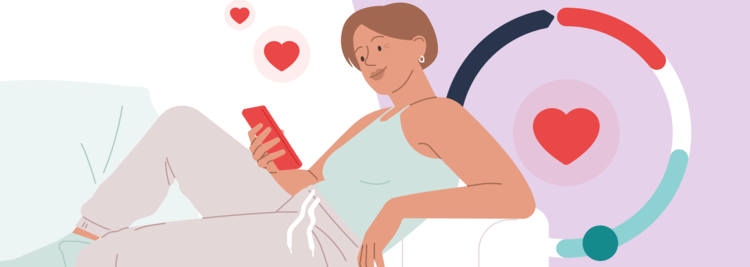Is your cycle 28 days? Or is it 35 days? Or has your cycle length changed recently? And what does your cycle length have to do with your sex drive?
-
Tracking cycle
-
Getting pregnant
-
Pregnancy
-
Help Center
-
Flo for Partners
-
Anonymous Mode
-
Flo app reviews
-
Flo Premium New
-
Secret Chats New
-
Symptom Checker New
-
Your cycle
-
Health 360°
-
Getting pregnant
-
Pregnancy
-
Being a mom
-
LGBTQ+
-
Quizzes
-
Ovulation calculator
-
hCG calculator
-
Pregnancy test calculator
-
Menstrual cycle calculator
-
Period calculator
-
Implantation calculator
-
Pregnancy weeks to months calculator
-
Pregnancy due date calculator
-
IVF and FET due date calculator
-
Due date calculator by ultrasound
-
Medical Affairs
-
Science & Research
-
Pass It On Project New
-
Privacy Portal
-
Press Center
-
Flo Accuracy
-
Careers
-
Contact Us
How are your cycle and your sex drive linked?


Cycle length varies between women and can also fluctuate across the year. Most women’s cycles are between 21 and 35 days long, as previous research with Flo participants shows.
When it comes to variations in cycle length between different cycles, a recent Flo study with data from over 19 million women found that fluctuations of about four days between cycles in 18 to 25-year-olds are quite normal.
As women get older, their cycles tend to get more regular, particularly between ages 36 to 40. After this point, cycles can start to vary quite a bit again, with averages of around 6.5 days of variations from cycle to cycle in women aged 51 to 55.
OK, now back to cycle length and your sex drive — is there a link? New research from Flo and collaborators found links between having a shorter cycle and a higher sex drive, but there might be trade-offs.
For this study, Flo’s science team worked with Sarah E. Hill, PhD — a researcher and professor in the psychology department at Texas Christian University, US — and Summer Mengelkoch, PhD, who is currently a postdoctoral fellow at the University of California, Los Angeles, US and was previously a graduate student in Sarah’s lab.
The research has been published in the journal Scientific Reports, which is part of the prestigious Nature Portfolio publishing group.
Who has the highest sex drive?
There is already quite a bit of research showing that hormonal fluctuations across the menstrual cycle impact our sex drive, which is higher during the follicular phase and peaks around ovulation.
Scientists who work in the field of evolutionary biology believe having a higher sex drive when conception is possible functions to give the human species the maximum chances of reproduction, which is essential for our species to survive.
Previous research from Sarah’s lab, which included 176 female undergraduate students, hinted at a link between cycle length and how invested women are in having sex with a partner.
“What we really needed was a large data set that included enough women and several cycles worth of data per woman to understand the importance of the link we had observed between cycle length and sex drive,” Summer explained about the research.
So, we used data from 16,327 Flo members and looked at their cycle length across 10 consecutive cycles, as well as how often they logged sexual activity, a high sex drive, or masturbation across each cycle.
What we found was that, on the whole, women with shorter, more regular cycles have a higher sex drive. But, like most things in biology, this can come at a cost because energy can’t be spent more than once. Physical symptom logs — like fatigue, insomnia, and food cravings — were also more common in women who logged more sexual activity.
“Our research indicates that if someone is investing more energy into being sexually active, these physical symptoms may be the trade-off,” Summer commented.
“But it’s important to understand that these are patterns that we see in large sets of self-reported data when we are trying to understand human behavior on a large scale,” she continued. “The size of the variation in symptom reporting is not huge, so it doesn’t mean that you should expect to feel exhausted, for example, in exchange for being sexually active, on a personal level.”
Why research about menstrual cycles is important
“A lot of changes happen in women’s bodies throughout their cycle,” Liudmila Zhaunova, PhD, director of science at Flo, UK, commented.
“This year alone, we’ve seen really interesting research on this, including papers showing that mental agility is higher while women are on their periods, that women experience disruptions in their sleep patterns leading up to their periods and that this is linked with reductions in positive emotions, and that brain network dynamics change throughout the cycle. Our research is particularly interesting because it highlights connections between menstrual cycles and human behavior, such as sex drive,” she continued.
There are still many open questions about women’s menstrual cycles and their links not just with behavior but also with women’s health. It’s a topic that hasn’t seen enough focus in the past — something that the Flo science team and their collaborators are trying to address.
“Women’s cycles are still not taken seriously enough. This is something that I sincerely wish would change,” Liudmila added. “With our research, we are contributing much-needed knowledge to the field of women’s health and addressing critical gaps in research.”


Hey, I'm Anique
I started using Flo app to track my period and ovulation because we wanted to have a baby.


The Flo app helped me learn about my body and spot ovulation signs during our conception journey.


I vividly
remember the day
that we switched
Flo into
Pregnancy Mode — it was
such a special
moment.
Real stories, real results
Learn how the Flo app became an amazing cheerleader for us on our conception journey.

